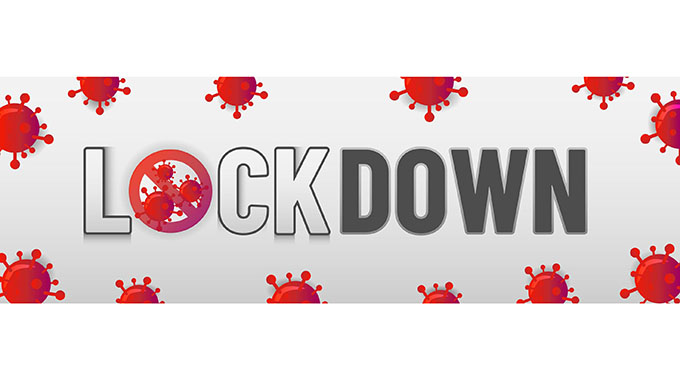Editorial Comment: Need to enforce lockdown rules

The modest, but noticeable rise in infection rates in the latter part of last week is a worrying trend that needs prompt action.
The infection rates are easier to interpret.
After high levels of voluntary observation of health advice during the second wave in the first two months of the year and stretching into the first week of March, when people were still nervous as the economy opened, there was a degree of slackness last week.
We are still under lockdown.
It is just at a lower level, but the rules are still in place and have to be followed and enforced.
While most people were still wearing masks in public, more were wearing them half way down their face, or even warming their neck, and there was far more carelessness about social distancing even in places where it was perfectly possible to stand a metre or two apart and have a conversation.
This sort of growing complacency was what triggered our second and very bad wave.
Had we all followed the personal protocols in December, the reversion to a Level Four lockdown might well have been avoided in January.
It needs everyone to understand that until our infection rate is zero, Covid-19 is in our communities.
Low rates and low numbers of active cases are enough to trigger off a new wave.
The health experts have a useful measure, how many people does the average infected person infect, to plot the progress of a pandemic.
If, on average, each infected person infects less than one person before they get better, then infection rates fall.
This is why lockdowns and other restrictions are used throughout the world to make that transmission rate less than one.
But if, on average, each infected person infects more than one person, even if the average is something only just above like 1,001, then the number of infected people grows.
The opening of the economy was predicated on two factors, a low number of infected people, the number of active cases to be exact, and on Zimbabweans continuing to be very serious about taking precautions to keep themselves free of infection.
Regrettably, it appears the reduction in the number of police deployed to enforce compliance with masking and socialising rules has been taken as an excuse by the irresponsible to fool around.
We can even see this at suburban bottle stores that were allowed to reopen so people can buy a few beers to take home.
But it is not difficult to find a small group round the back at any shopping centre sitting close together, and you cannot drink with a mask on properly.
Even the lifting of roadblocks has seen a rise in the numbers of mushikashika and pirate kombis, and if you have a good hard look inside one of those pirates, using the door as almost all now have dark plastic windows, you will see some dreadful overcrowding, tightly shut windows as they are screwed on, and the conductor bellowing without a mask on.
The mushikashika are, curiously, more compliant with masking, overcrowding is more limited and windows are at least partially open; many could still pretend to be a group of five people sharing a ride, which is legal.
To protect the innocent, the vast majority, it appears we need more enforcement.
Roadblocks are still required, with pirate kombis being number one on the hit list and, as it is impossible to tell whether a private car is carrying a group of co-workers or friends or is a mushikashika, limiting the numbers sitting in a car.
Zupco could also take some action to have buses parked less and driving more, both to give passengers a safer alternative and to reclaim the revenue they are losing to the pirates and mushikashika.
Zupco fares are now tending to be higher than pirates, and a hard look at these especially with full commuter traffic, seems called for. Legal public transport is viable if pirates are banned in reality as well as theory.
At the same time, patrols are needed on the streets and in public places to at least enforce masking. Arguments can arise over social distancing but you are either wearing a mask or you are not. And doing something about public drinking, and there are laws about that regardless of Covid-19, seems another fairly easy point to tackle.
In recent decades police have eased up on suburban street patrols, on foot or bicycle. For all sorts of reasons the policeman on the beat is useful, and right now they could do something about private parties, shebeens and curfew breaking. The curfew might be shorter, but it is still there, 10pm to 5am, and needs to be enforced.
The sharp decline in the frontline workers coming forward for vaccination last week suggests that the vast majority in this group who were ready, willing and eager to be vaccinated have now had their first jab.
There is a still a small minority who are hanging back, for some reason of their own, but the time appears to have come when another group can be called in for vaccination.
There will shortly be a need to start giving these first 36 000 their second jabs as they end the four-week waiting period, so some sort of queue management is going to be needed.
Staff need to separate second jabbers, who have all their personal details already on record and so can be processed a lot faster, from the first jabbers who still have to sit in front of the nurse recording their answers to 20 questions before being passed to the nurse with the needles. Even the third nurse filling in the card has a lot less to do for a second jabber. But this is just logistics and organisation.
With the next batches of our secured vaccine supplies now in the pipeline and starting to arrive very soon, we can and should maintain the momentum of our vaccination programme. This is important.
We have a target of a minimum of 10 million people to be vaccinated to get into the range of herd immunity, so we cannot afford rest periods or allow the complacent in each group to slow the programme. And meanwhile, for at least the next year and probably two, the personal rules must be followed and enforced.
It is uncomfortable; it is a nuisance. But that is how we will all live through the pandemic until Covid-19 is finally wiped out. Complacency kills.









Comments